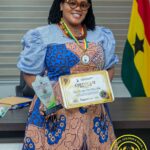Dr Agnes Naa Momo Lartey, Minister of Gender, Children and Social Protection, says the lived experiences of human trafficking survivors must shape Ghana’s laws, policies, and programmes .
In a speech read on her behalf at the launch of the commemoration of the World Day Against Trafficking in Persons (Blue Day) in Accra, Dr. Lartey said many survivors had reported being deceived, overworked, starved, molested, and/or forced into prostitution.
“She said victims were enslaved and their dignity and freedom taken away from them and hearing survivors’ experiences would mean building systems that were trauma-informed, survivor-led, and rooted in dignity.
The event was on the theme: “The Human Trafficking Law @ 20: The Journey So Far in Ghana.”
According to the United Nations Office on Drugs and Crime, human trafficking involves the recruitment, transportation, transfer, harbouring or receipt of people through force, fraud or deception, for the purpose of exploitation.
Blue Day, observed annually on July 30, raises awareness of the dangers of human trafficking. The global theme for this year is: “Reach every victim of trafficking, leave no one behind.”
Dr. Lartey highlighted the exploitation of Ghanaian women and men lured by fraudulent agencies with promises of lucrative jobs in the Middle East.
She said, there, they were abused, raped, tortured, disgraced and reduced to nothing, with some experiencing mental health issues and losing their dignity, respect, and everything they worked for.
The minister cited reports indicating that human trafficking was now the second-largest illicit trade after firearms, surpassing drug trafficking, and estimated to be worth over $30 billion annually.
“There have been a lot of successes including the operationalisation of adults and children shelters as well as the transit shelters as the victims serve as key witnesses during prosecutions. However, we need to have adult male shelters to provide similar trauma-informed care for them as well,” she added.
In a speech read on his behalf, Mr. Albert Kwabena Dwumfour, President of the Ghana Journalists Association (GJA), pledged ethical reporting on trafficking issues.
He stated that members would steer clear of sensationalism and revictimisation, instead prioritise stories that highlight resilience, rehabilitation, and reintegration.
“We will also give voice to the experiences of survivors and empower them to share their stories in a way that contributes to healing and advocacy.”
Madam Helen Adjoa Ntoso, Chairperson of the Parliamentary Select Committee on Gender and Children Welfare, said the Committee had inspected all shelters in Greater Accra and advocated improved care for trafficked children, with plans to extend inspections nationwide.
She reaffirmed the Committee’s continued commitment to support and collaborate with the Ministry in combating human trafficking.
GNA


















